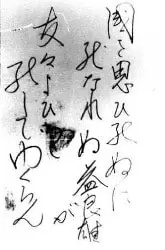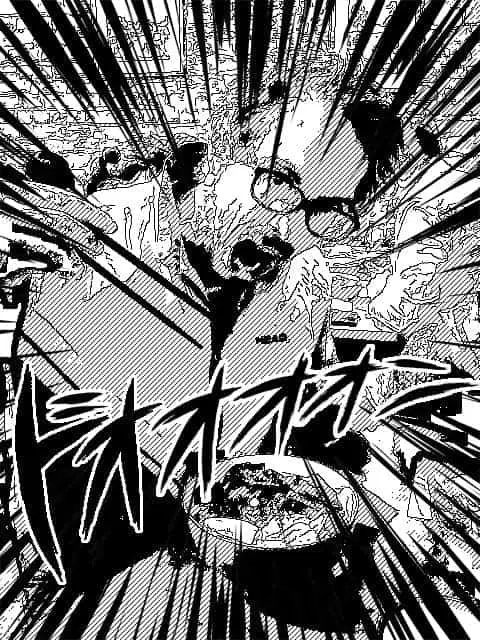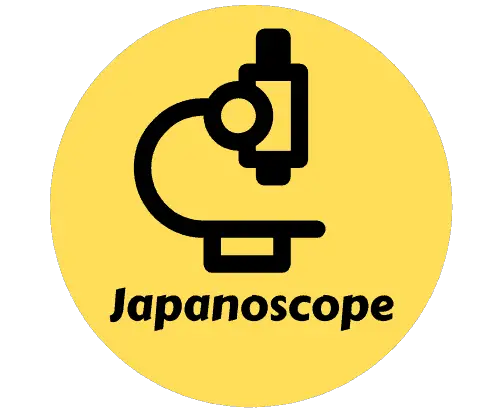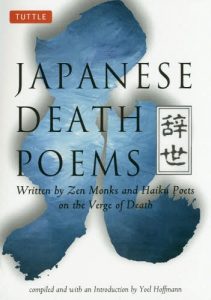Japanese Reading Difficulty
9/12 Could be read by 5th grade level student in Japan
Themes
Poetry, Death, Mortality, nature.
Text Type
Poem, Haiku
About Japanese Death Poems
Today we’re taking our third look at Japanese death poems. Now like the name suggests these are poems that people in Japan have written through the ages just before they die, or on their deathbed, and they’re fascinating little windows into a whole different world across time and space -windows on people reflecting on their lives in their final moments.
These poems have been around since around the 7th century.
I first came across these through this book Japanese death poems by Yoel Hoffman. It’s a fantastic little compendium of these poems and translations. So I thought I’d go through and introduce some of these but also give my own take. I’ll do some of my own translations, because there’s often quite a few different ways that these things can be done.

A translation of an Instagram post from the artist
香波
Ko-Ha
Died 14 August 1897
Following on from the misty moons, and writers who are dreaming in our previous look at Japanese Death Poems, we have a death poem by Koha 香波. Once again we have somebody with a pretty groovy name. I wish we could all have names as good as these guys. Ko 香 means a “fragrance” or a “smell” and 波 ha means “wave”. So Koha is a fragrant wave. You often hear references to fragrances, and the idea of lotuses and flowers in Buddhist thought. Indeed, if you go to a temple, you often see they put out incense burning to create an otherworldly feeling. Koha died in 1897, so we’re going relatively modern here! His poem goes:
筆投げて
月に物言う
ばかりなり
Fude nagete
Tsuki ni mono iu
Bakari nari
Now, I hurl my pen
From here on
I talk with the moon.
Explanation of the poem
筆投げて
I feel like this one has a little bit of that attitude to it. Koha is talking about throwing his pen, or his brush. A bold statement for a writer. I imagine people at this time would have been writing with brushes more than ballpoint pens. So we can take 筆, fude, to mean pen.
月に物言う
Once again in our Japanese Death Poems we have the 月 つき moon coming in. As most people that have had some experience of Japanese culture will know, we find a lot of reverence for the moon, and doing moon viewing and that sort of thing. 物 means thing and 言う means say, so I’m going to say things to the moon.
ばかりなり
ばかり is “only”, so Koha is saying “all” I’m going to do is speak to the moon. Then again, as many other poems, we’ve got なり nari, which is one more of our 切れ字 kireji, which is there to give an emphasis. People probably know the word なり nari as meaning “to become”, or it’s often a way of saying “is”. I was confused by the word in the past, for example when a waiter would bring an order and say something like “ビールになります”, which sounds strange if you say “this is becoming a beer”. It actually just means “here is a beer”, so it’s just saying this is something. So this “nari” is different to “kana”, which is offering a sense of wonder. Nari is a bit more solid, and saying ばかりなり is really saying “that’s all all I’m doing”, from here here on all I do is talk to the moon.
So let’s just refer back to Hoffman translation which is:
I cast the brush aside –
From her on I’ll speak to the moon
face to face.
An English Parallel
All of this made me think of the Bob Dylan song Tombstone Blues, which isn’t talking about deaths, but it’s still talking about that sense of a writer or somebody that’s involved in the sciences, or the worldly ways reaching the edge of where that can take you. Reaching the end of logical thought and just wanting to “throw it”. It’s that sense of wanting to just throw your tools across the room because they can’t help you anymore.
Bob Dylan writes in Tombstone Blues,
“The geometry of innocence, flesh on the bone
Causes Galileo’s math book to get thrown
At Delilah who’s sitting worthlessly alone
But the tears on her cheeks are from laughter”
Sometimes sentiment can be similar across centuries and continents, people and place.
Japanese poetry books
Japanoscope is a registered affiliate with several online shops and may receive a commission when you click on some of the links within content.

Who is behind this site?
I’m Peter Joseph Head. I lived in Japan for four years as a student at Kyoto City University of the Arts and on working holiday. I have toured the country six times playing music and speak Japanese (JLPT N1).
ピータージョセフヘッドです。3年間京都市立芸大の大学院として、一年間ワーキングホリデーとして日本に住み、6回日本で音楽ツアーをし、日本語能力試験で1級を取得しました。要するに日本好きです。
Podcast: Play in new window | Download







